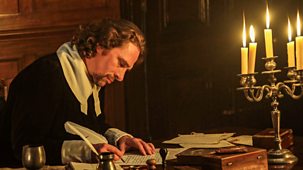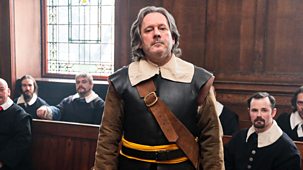
Series 1: Episode 2
January, 1649.\n\nOn Tuesday 9 January 1649, crowds gather in Cheapside, London as a proclamation is read out. King Charles I will be put on public trial at Westminster Hall in ten days’ time. It sends shockwaves through the city. \n\nThe next day, commissioners - senior judges from around the country - gather to prepare for the unprecedented trial of the king. Their meeting is recorded in surviving transcripts. Words like ‘wicked’, ‘tyrannical’ and ‘cruel’ are all used to describe the monarch. Although the consensus is that Charles is a tyrant, only half of the commissioners appointed actually attend the meetings at Westminster Palace, in fear of being indicted as traitors. Support is on thin ice and many parliamentarians are uneasy about the process of a treason trial, for the outcome is plain for all to see. Lord Fairfax, the lord general of the New Model Army, is representative of the view of many parliamentarians. He believes a compromise should be made and declares he will have no part in the King’s trial. However, Fairfax’s counterpart - Oliver Cromwell is going full steam ahead. He allegedly states, ‘We will cut off his head with the crown upon it!’\n\nUp and down the country, printing presses are in overdrive. A wave of pamphleteering discusses the topic of the day - Crown verses Parliament. However, one printed text has not been cleared for circulation. On 14 January, the first edition of Eikon Basilike (Royal Portrait), a spiritual autobiography of the king, is destroyed before it can leave the print house.\n\nParliament cannot risk the release of powerful royalist propaganda as they struggle to build a case against the king. They are already hamstrung by the existing law, which has been written by the monarchy. In less than a week they need to create a watertight charge that will see Charles brought to justice for his crimes against a devastated country. The trial will essentially accuse the king of war crimes. \n\nOn 20 January, the first day of the trial, Westminster Hall is packed. People hang off balconies to watch as the king is made to answer to the common man. The charge is delivered - ‘tyrant, traitor, murderer' - but no-one could have predicted what was to happen next. Charles will not acknowledge the court, a court he deems illegitimate. If the king will not plead guilty, or not guilty, there is little trial to be had. \n\nOver the next three days, the king and the lord president, John Bradshaw, become embroiled in a battle of wills. Is it Charles’s arrogance that leads him to refuse to accept the authority of the court, or is it a cunning and politically astute method to defend his crown and his life? With only days left to try the king, Parliament have to move fast. Otherwise, they will end up on the scaffold.
Source: BBC 4
Most recent episodes of Charles I: Killing a King
Charles I: Killing A King
Series 1: Episode 3
On 23 January 1649, the third day of the king’s trial, Charles continues to publicly dispute the High Court’s legitimacy. There is no choice other than to move forwa ...
14-01-2025
BBC 4
Charles I: Killing A King
Series 1: Episode 2
January, 1649.\n\nOn Tuesday 9 January 1649, crowds gather in Cheapside, London as a proclamation is read out. King Charles I will be put on public trial at Westminster Hall in ...
13-01-2025
BBC 4
Charles I: Killing A King
Series 1: Episode 1
December, 1648.\n\nThe Puritan government has banned all celebrations and King Charles I is imprisoned in Windsor Castle. During Christmastide, the monarch would ordinarily feas ...
12-01-2025
BBC 4
Most popular episodes of Charles I: Killing a King
Charles I: Killing A King
Series 1: Episode 2
January, 1649.\n\nOn Tuesday 9 January 1649, crowds gather in Cheapside, London as a proclamation is read out. King Charles I will be put on public trial at Westminster Hall in ...
13-01-2025
BBC 4
Charles I: Killing A King
Series 1: Episode 1
December, 1648.\n\nThe Puritan government has banned all celebrations and King Charles I is imprisoned in Windsor Castle. During Christmastide, the monarch would ordinarily feas ...
12-01-2025
BBC 4
Charles I: Killing A King
Series 1: Episode 3
On 23 January 1649, the third day of the king’s trial, Charles continues to publicly dispute the High Court’s legitimacy. There is no choice other than to move forwa ...
14-01-2025
BBC 4



